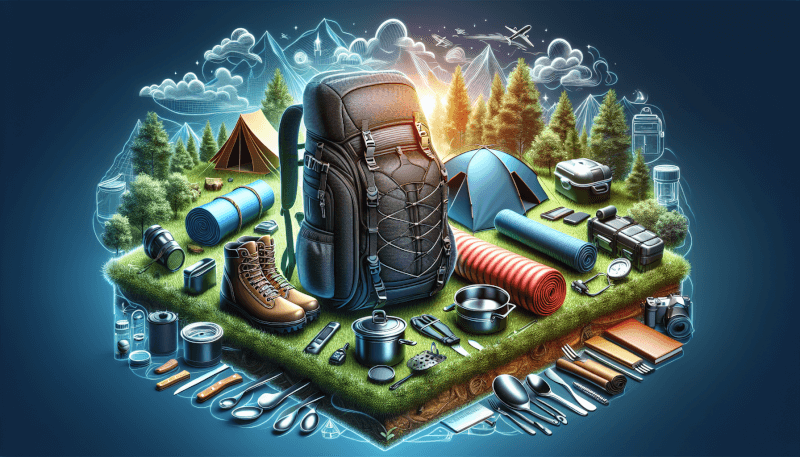Planning a camping trip can be an exciting and rejuvenating experience, but sometimes, your budget may limit your options. However, with a little creativity and careful planning, you can embark on a memorable outdoor adventure without breaking the bank. In this article, we will explore some tried and tested tips on how to plan a camping trip on a budget, ensuring that you can enjoy the great outdoors while still keeping your wallet happy. So grab a pen and paper, because you’re about to learn some valuable insights on how to make the most of your camping experience without compromising on your finances.
Choosing the Destination
When planning a camping trip on a budget, one of the first things to consider is the destination. Start by looking at nearby options within a reasonable driving distance. This will help you save on transportation costs and make the trip more accessible. Additionally, researching affordable camping sites is essential to ensure you stay within your budget. Look for campsites that offer reasonable rates or even free camping options. Exploring national parks is another great idea as they often have well-maintained campgrounds at affordable prices. Lastly, consider visiting during off-peak seasons, as rates tend to be lower and campsites less crowded.
Determining the Duration
Deciding on the length of your camping trip is an important factor in budget planning. Consider your time constraints and how long you can realistically spend outdoors. Opting for shorter trips, such as weekend getaways, can be a cost-effective way to enjoy camping without breaking the bank. Weekdays are often less crowded, and camping fees may be cheaper compared to weekends. If you have a bit more time, planning a camping trip over a long weekend can provide a longer getaway without using too much vacation time. For those with the luxury of extended vacations, planning a longer camping trip can be a wonderful and budget-friendly option.
Accommodation Options
When it comes to accommodation, camping is the most budget-friendly choice. Camping in tents allows you to connect with nature and is often the least expensive option. If you don’t have camping gear, renting equipment can be a cost-effective alternative. Another option for camping is using RVs or camper vans. While this may require an initial investment, it can save money in the long run as it eliminates the need for hotel stays and dining out. If you prefer a roof over your head, consider cabins or shelters available at many campsites. These provide a comfortable camping experience without breaking the bank. Be sure to explore free campsites as well, as they can significantly reduce accommodation costs. If you choose to book campsites, look for budget-friendly options that offer basic amenities at lower rates.
Transportation
Calculating travel costs is crucial to sticking to your camping budget. Consider carpooling with friends or family to share the expenses or splitting the cost of gas if you’re driving alone. Public transportation can also be a cost-effective option, especially if you don’t have to travel a long distance. If camping in a remote area or traveling with a large group, renting a vehicle might be necessary. In this case, compare prices from different rental companies and choose the most affordable option. Remember to factor in fuel costs and any extra fees when calculating your transportation budget.
Food and Drinks
Planning meals in advance is an excellent way to save money while camping. Make a list of easy and cost-effective recipes that require minimal ingredients and preparation. Bringing your own food and snacks from home can significantly cut down on expenses, as buying groceries at local grocery stores is usually cheaper than dining out. To keep perishables fresh, use a cooler with ice or ice packs. Exploring local grocery stores near your campsite can also provide opportunities to find affordable and fresh ingredients. Additionally, utilizing camping grills or open fires for cooking can be an enjoyable and cost-effective way to prepare meals while camping. By avoiding excessive eating out, you’ll be able to stick to your budget and still enjoy delicious meals.
Activities and Entertainment
Camping provides an array of activities and entertainment options that are typically low-cost or free. Research free or discounted attractions in the area you’re visiting, such as hiking trails, nature centers, or historical sites. Hiking and nature exploration are popular camping activities that allow you to connect with nature and immerse yourself in beautiful surroundings. If your campsite is located near natural bodies of water, consider swimming, fishing, or boating as these activities are often free or have minimal costs. Birdwatching or stargazing can also be fascinating and budget-friendly ways to enjoy the outdoors. Organizing group games and activities can bring people together and create memorable experiences. Engaging in leisurely activities like reading, writing, or simply relaxing in nature is another great way to enjoy the camping trip without spending extra money.
Budgeting and Expenses
Creating a camping trip budget is essential for staying within your financial means. Allocate funds for different categories such as campsite fees, transportation, food, activities, and equipment purchases or rentals. Tracking your expenses throughout the planning process and during the trip will help you stay on track. Look for discounts or coupons available for activities, attractions, or camping gear. Consider joining membership rewards programs, such as loyalty programs from outdoor retailers, to take advantage of exclusive deals. When purchasing camping gear and equipment, choose affordable options that still meet your needs without compromising quality. Avoid unnecessary purchases by making a list of essential items beforehand and sticking to it.
Safety and Precautions
Taking safety precautions is crucial when planning a camping trip. Before heading out, check the weather forecast for possible storms or extreme conditions. Pack essential safety and first aid supplies, such as a first aid kit, flashlight, and emergency supplies like matches or a lighter. Informing friends or family about your trip and sharing your camping itinerary is important, especially if you’ll be camping alone. Familiarize yourself with the campground rules and regulations to ensure a safe and enjoyable experience. Be aware of wildlife and natural hazards in the area and take necessary precautions to stay safe. Lastly, follow fire safety protocols and guidelines to prevent accidents and protect the environment.
Tips for Saving Money
Saving money while camping is possible with a few simple strategies. Sharing expenses with fellow campers, such as gas costs or campsite fees, can help reduce individual costs. If you don’t have camping gear or equipment, consider renting or borrowing from friends to avoid purchasing items that you may not use frequently. Planning ahead and making a camping checklist will help you avoid impulse purchases and unnecessary expenses. Opt for reusable camping essentials to reduce waste and save money in the long run. Consider investing in solar-powered or battery-operated equipment to avoid relying on disposable batteries or electric hook-ups. Minimize the use of campground amenities that come with extra charges and focus on enjoying the natural surroundings instead. Lastly, practice Leave No Trace principles by reducing waste and taking care of the environment around you.
Preparing and Packing
Preparing and packing efficiently for your camping trip can save you time and prevent unnecessary expenses. Create a camping checklist to ensure you have all the necessary items. Pack lightweight and multipurpose items that will be versatile and practical during your trip. Bring appropriate clothing and footwear based on the weather conditions and the activities you plan on doing. Include camping essentials such as a tent, sleeping bag, camping stove, cooking utensils, and basic toiletries. Consider specific weather conditions and pack accordingly, whether it’s rain gear, warm clothing for chilly nights, or sunscreen for sunny days. Protect your valuable belongings by keeping them in secure containers or locking them in the car. Lastly, have emergency contacts and maps readily available in case of unforeseen situations.
Planning a camping trip on a budget is an exciting adventure that allows you to enjoy the beauty of nature without breaking the bank. By carefully choosing the destination, determining the duration, considering accommodation options, planning transportation, preparing meals in advance, engaging in affordable activities, budgeting expenses, prioritizing safety, implementing money-saving tips, and efficiently preparing and packing, you can have a memorable camping experience while staying within your financial means. So go ahead and start planning your budget-friendly camping trip – the great outdoors awaits you!


